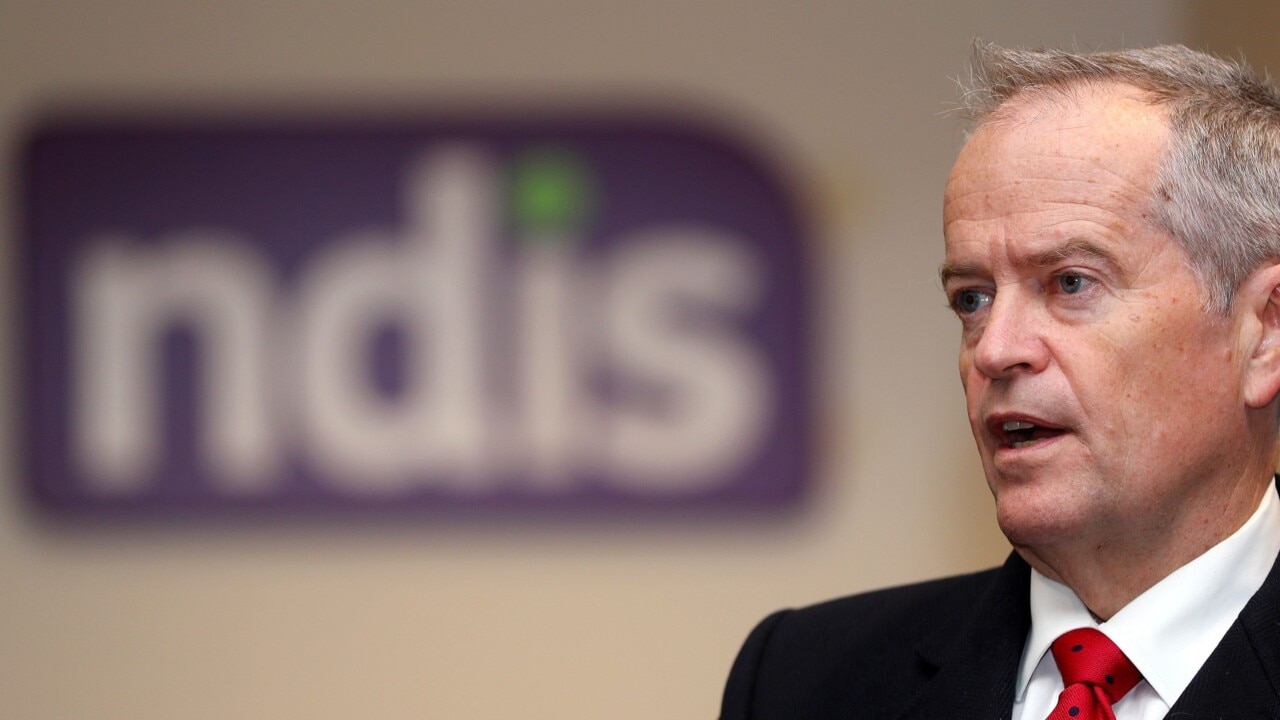NDIS rorts and extravagant wages are dragging down the economy
- 5:00AM JUNE 10, 2024
- 43COMMENTS
Across the country, more and more companies are failing. Cafes are closing and construction firms are going into administration at a rate not seen since the 2012-13 financial year. But there is one sector in the economy that is growing – the public service – and one sector within that that outstrips them all: the National Disability Insurance Scheme.
A recent analysis of ABS data found over the past 12 months one-third of all jobs created in Australia were for the NDIS. These include support workers, plan managers, local area managers, service technicians, support co-ordinators, service co-ordinators, service team leaders, community managers, “positive behaviour support practitioners”, rostering officers, case workers, allied health professionals, job coaches, funding operations managers, policy officers, business development managers and respite retreat facilitators, as well as NDIA administrators to fund them all.
Despite the fact we are in a housing crisis with an extreme level of demand for new accommodation, and despite the fact national housing targets require 90,000 more tradies than we have, the NDIS is sucking up the workers that would normally be found in other industries.
This is partly because many NDIS jobs are cushier and better paid than alternatives. Looking at Seek.com, for example, one can find aged-care jobs being advertised at $30 per hour. NDIS support work jobs, on the other hand, are more than double that, with the going rate $67. The rate goes up to $218 per hour on weekends in remote or rural regions.
In an analysis published over the weekend, the Australian Financial Review’s economics editor, John Kehoe, argues that the NDIS is attracting a significant portion of Australia’s workforce, which is distorting the labour market and the economy as a whole. This phenomenon, known as the “Baumol cost disease”, occurs when wages in an unproductive industry rise regardless of value created. As a result, firms in other industries must compete for the same workers by increasing their wages as well, even if they have not had an increase in profits. This, in turn, makes everything more expensive. In the case of the publicly funded NDIS, the increased costs are borne by us all.
Participants of the NDIShave noticed this effect as well. On Subreddit r/AusFinance, one discussion thread focuses on why the NDIS is so open to rorting. One commenter, a self-identified NDIS participant, writes that they have personally experienced “support co-ordinators billing three hours at $90 an hour to submit a form”, “people with no experience charging $67 an hour to fold washing”, and “people charging $67 plus $1 for every kilometre driven” to help participants attend appointments. “One (appointment) I have is about 45 mins away, and on a Saturday. It is nearly $500 for an unqualified person to drive me there, wait, and drive me back,” she writes.
NDIS facing scrutiny as billions of dollars are ‘misallocated’
Sky News host Chris Kenny says the NDIS “rorts” are extensive as billions of dollars are being wasted and misallocated. “An area of government spending that is running out of control, an area where some people are profiting wildly,” he said. “The NDIS will cost taxpayers about $42 billion thisMoreREAD MORE:Stop blame game on NDIS mess|Reshaping our disability support must be a priority|In annals of dodgy policy, you can’t go past NDIS|In the same discussion thread, another forum member shares that they were quoted $2000 for a “spring clean” of their home, which included rubbish removal, only to discover the cleaner was the spouse of the Local Area Co-ordinator who referred them to the service. They found a non-NDIS-connected cleaner who did the job for $200.
Another Reddit user shared an anecdote that is worth quoting at length: “Just to give you an insight on pay rates – I used to care for my sick uncle who has now sadly passed. I did it for free for ages because I wanted to help out, but my uncle insisted on setting up an ABN so I could get paid (I’m a nurse full-time). I decided to charge a reasonable rate per hour, but was told by his NDIS co-ordinator that I needed to charge more, so they sent me a pay scale and a minimum of what I could charge. It was much more than what I thought was reasonable.”
As the government is forced to pour more money into the NDIS to pay exorbitant wages, it has less money to spend elsewhere. We have gaping holes in our defence capabilities. We have a massive teacher shortage. Low-income Australians cannot find bulk-billed GP appointments. Waiting lists for surgeries are blowing out. Emergency rooms are crowded and understaffed.
Not only that, but workers who charge $67 to fold laundry are not developing their own skills to add value to the economy over the long term. The nation has a massive skills shortage, but why would anyone bother to learn skills at a cafe, restaurant or retail store, when they can charge $67 per hour just to sit in a carpark?
With more money going to the NDIS, and less money going to other areas such as those that actually help the economy, Australia’s overall productivity is slowing down.
These two issues are usually considered in discrete terms, but Kehoe’s analysis shows us they are related. It might very well be that our productivity is grinding to a halt because of the massive burden of cost the NDIS is wreaking – not just on taxpayers, but on firms in the private sector who must compete with its ridiculous wages.
This is all before we acknowledge that nine out of 10 plan managers on the NDIS show significantsigns of fraud– according to NDIS integrity chief John Dardo – and before we acknowledge the $44bn-per-year scheme is growing by more than 20 per cent annually.
Acknowledging that something has gone very badly wrong will be the first step in rectifying the damage. It’s not the fault of participants on the NDIS, and it is not the fault of providers who do the right thing and provide value to their clients. But it is the fault of ministers and bureaucrats who launched a scheme that was fatally flawed and who have failed to provide it with adequate governance. As one Reddit user quipped online: “There will be a royal commission into NDIS within the next five years. Which will end up costing millions as well.”
More stories on this topic
By EDITORIAL
- Forums
- Political Debate
- NDIS rorts eating Australia alive vote 1 labor
NDIS rorts and extravagant wages are dragging down the...
-
- There are more pages in this discussion • 14 more messages in this thread...
You’re viewing a single post only. To view the entire thread just sign in or Join Now (FREE)
 Fraud and eligibility criteria are among the problems in the $44bn scheme that National Disability Insurance Scheme Minister Bill Shorten needs to fix. Picture: NewsWire/Martin Ollman
Fraud and eligibility criteria are among the problems in the $44bn scheme that National Disability Insurance Scheme Minister Bill Shorten needs to fix. Picture: NewsWire/Martin Ollman









